Outnumbered Republican women raise cash to combat well-funded Democrats on Election Day
- Oops!Something went wrong.Please try again later.
- Oops!Something went wrong.Please try again later.
- Oops!Something went wrong.Please try again later.
In a debate this month for a coastal Virginia congressional seat, Republican Jen Kiggans said that on a scale of one to 10, she’d give the economy right now a one, or, “maybe a half.”
The state senator seeking to unseat Democratic Rep. Elaine Luria said her concerns about the economy come from speaking to moms at carpools and people at civics leagues.
“They talk to me about the gas prices that are too much,” Kiggans said. “They talk to me about their grocery prices. They talk to me about their savings account.”
Kiggans is one of many Republican woman candidates across the nation focusing on "kitchen table issues" like inflation and food prices to combat Democratic foes this fall. They're also getting significant financial support from political action committees aiming to elect more conservative women in Congress.
Stay in the conversation on politics: Sign up for the OnPolitics newsletter
These PACs are up against the Democrat-aligned Emily’s List, one of the best-funded PACs in modern politics. After declaring 2020 the "year of the Republican woman," they’re hoping candidates like Kiggans will be the deciding factor in which party takes over the House in 2022.
Like Kiggans, the candidates themselves are focusing on topics like the economy and border security, while Democrats like Luria go after Republicans on abortion rights, a key campaign issue since the Supreme Court overturned Roe v. Wade earlier this year.
This is no accident. By and large, Republican women are less likely to focus on topics like like reproductive health and women’s rights, experts told USA TODAY. That's in stark contrast to trends on the Democratic side.
“You don't wind up with that many Republican female candidates touting the fact that they're women,” said Michele L. Swers, a government professor at Georgetown University.
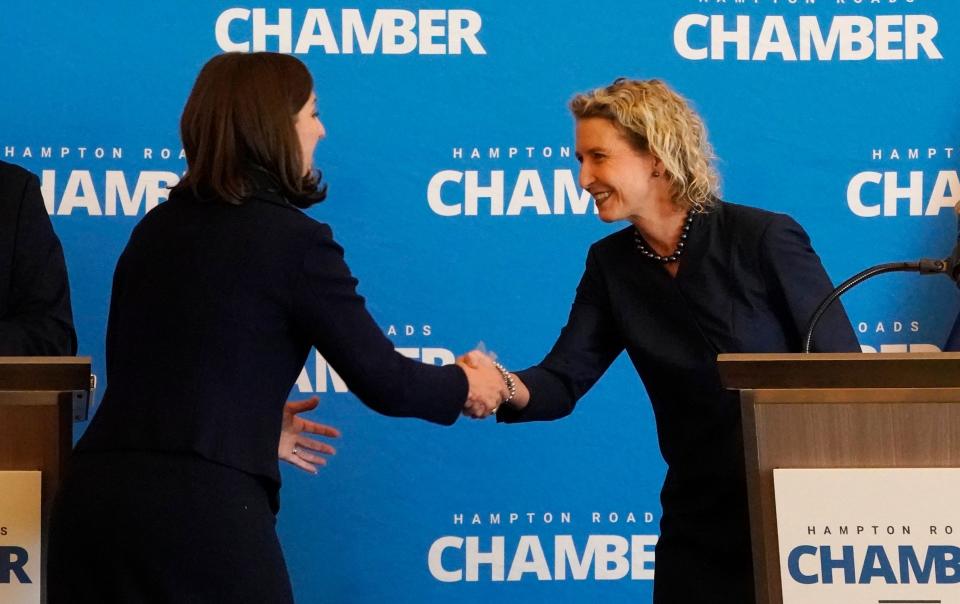
Abortion Money: Midterms will test if abortion rights dollars can turn into votes.
Republican women rely on network of funds to boost their candidacies
Efforts to elect women on the right are far less centralized than those on the left.
Many candidates are banding together to form committees that pool fundraising efforts. A top House Republican is using a leadership PAC to support other women. Others formed super PACs that can spend money on advertisements.
“For a while now, the Republican Party has at least wanted to recruit a more diverse set of candidates, so they made women their recruitment chairs,” Swers said. “They’ve put some effort into it, but their donor base generally is not overly responsive."
That’s where pro-women PACs come into play.
Opinion: GOP is no longer the party of old, white men. Meet the conservative women on the rise.
The leading conservative group backing women candidates is Winning for Women, an organization whose federal super PAC raised $9.1 million through the end of September, far less than the $61.4 million that EMILY'S List raised.
Through the end of August, Winning for Women spent $6.7 million on advertisements with $4.5 million of that going to House races. The super PAC spent $2.3 million trying unsuccessfully to protect Rep. Jamie Herrera Beutler’s seat in a primary against Trump-backed candidate Joe Kent, and poured about $220,000 into supporting Kiggans against Luria, who is outraising the state senator by a nearly four-to-one margin.
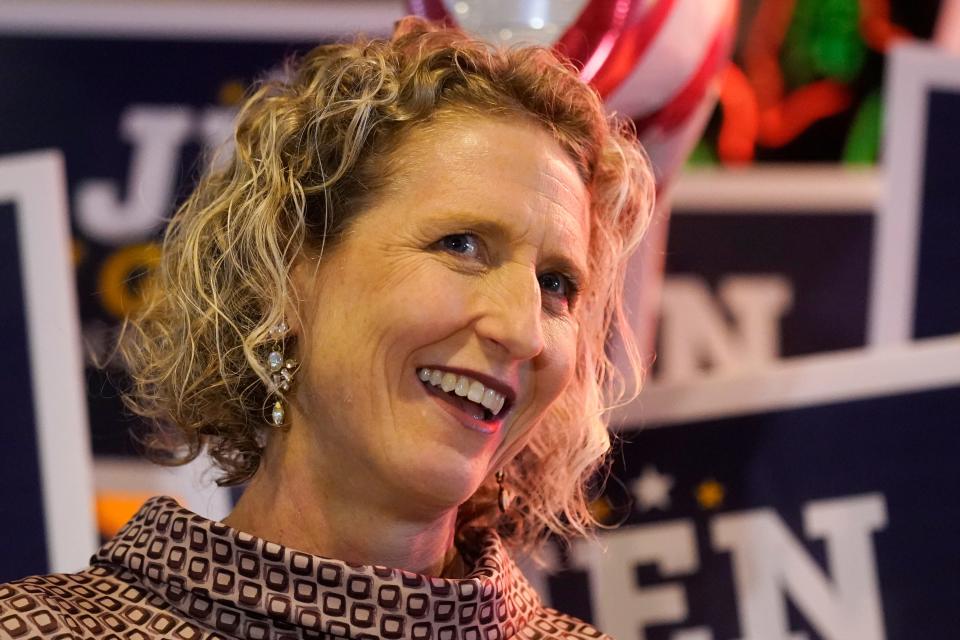
Mayra Flores: Texas Congresswoman is latest Latina to win big in politics. Can others do the same?
“We look for candidates who are the strongest, who have good campaign teams, who can fundraise, who are the best fit for their districts,” the group’s spokesperson Olivia Perez-Cubas, said on Fox News after the 2020 election. “We don’t go in and support women simply because they’re women. These women are the absolute best.”
Cathy Wineinger, professor at Western Washington University and author of “Gendering the GOP,” said while donors on the Democratic side may be inclined to donate to a group like EMILY's List specifically to fund a woman candidate, the same motivation is generally missing on the Republican side.
"The difference is in terms of what the parties value ideologically and politically," Wineinger said. "There are a lot of Republican Party donors who do tend to be more conservative and are not prioritizing women's representation because of party culture."
Rep. Elise Stefanik, R-N.Y, a leading voice on the right calling for more Republican women in Congress, is using a leadership PAC to support Republican women candidates. Stefanik is the third-ranked Republican in the House, a position she took after Republicans ousted Rep. Liz Cheney from the leadership post over her opposition to former President Donald Trump.
The PAC raised about $922,000 through the end of September. Through the end of August, the PAC dished out $465,000 to the campaigns of 51 women candidates for the House. Kiggans’ campaign received $10,000.
A group of six Republican women running for Congress have taken fundraising into their own hands.
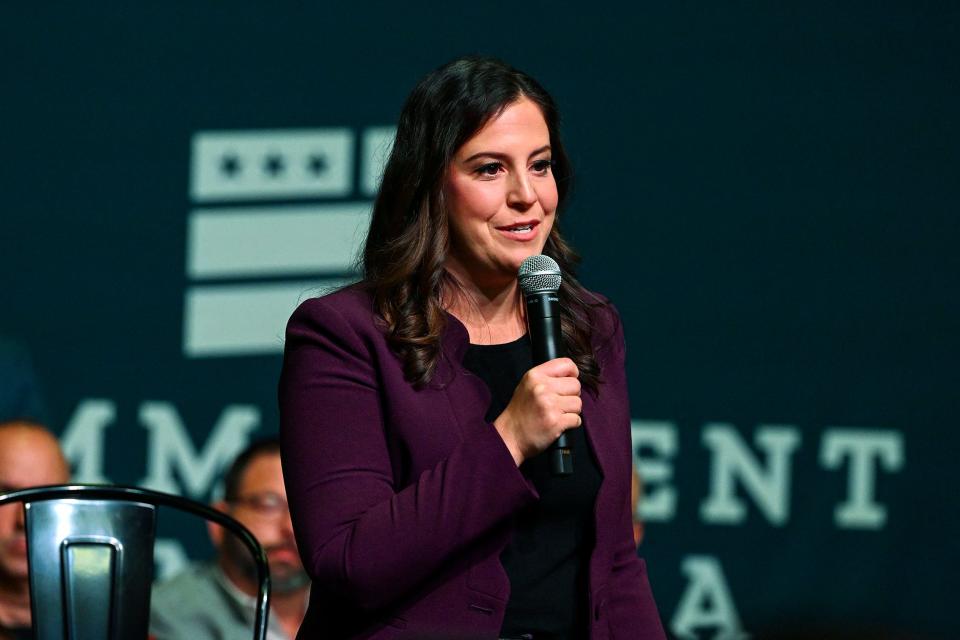
Rep. Beth Van Duyne, R-Texas, along with Rep. Michelle Fischbach, R-Minn., started the Iron Ladies PAC, a joint fundraising committee that includes Kiggans and named in honor of Britain's first woman prime minister and conservative leader Margaret Thatcher. The PAC has raised about $341,000 through the end of September.
Kiggans and Amanda Adkins, who is running for a seat in Kansas, are being outraised in bids to unseat Democratic incumbents. Cook Political Report rates Kiggans' district as a Democrat toss-up, meaning hers is among the most competitive House races this cycle, but Luria has a slight edge. Esther Joy King, who is running in Illinois, is also in a Democrat toss-up race, but she's vastly outraising her opponent for an open seat.
Another candidate aligned with Iron Ladies, Rep. Mayra Flores, R-Texas, has a slight edge in a Republican toss up race. She's fighting to keep her seat against Rep. Vicente Gonzalez, D-Texas.
“We wanted to get together and do what we could to make sure that when women are running that they feel supported, and a lot of times that support starts out with financial support,” Van Duyne said.
Van Duyne and Fischbach were part of a similar coalition of Republican women in 2020 dubbed the "conservative squad" and advertised as an answer to the progressive coalition of mostly women lawmakers called the "squad" led by Rep. Alexandria Ocasio-Cortez, D-N.Y.
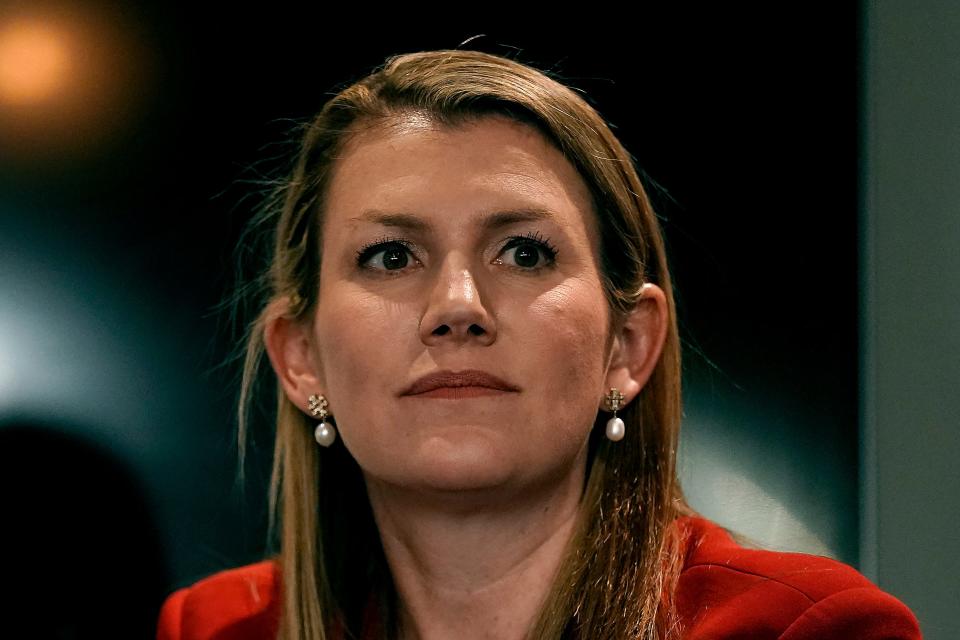
Van Duyne and Fischbach said their goal is to financially “level the playing field” for their cohort of conservative women. "We want to make sure that we're helping those Republican women that are in those races where Nancy Pelosi is coming down on their ads with millions of dollars to defeat them," Fischbach said. "We're about helping other Republican women get through that."
During Fischbach's 2020 run to unseat a 30-year incumbent, the Democrats' House Majority PAC spent $4.7 million to oppose her. The same PAC has spent $113,000 this year to oppose Flores in South Texas.
“As much as Democrats might talk about wanting to have a representative group in Congress, they didn't want it on the Republican side,” Van Duyne said. “None of them are running on a platform that, you know, hey, support me because I'm a female candidate."
Virginia House: Inflation fears pressure Democrats in Virginia House races. Could they be a bellwether?
South Texas: Republicans made inroads with Latinos last election. Now, they’re hoping for a red wave

Abortion rights money funds Democratic women
On the Democratic side, fundraising for women candidates has long been dominated by EMILY's List and its mission to elect Democratic women who support abortion rights.
A significant portion of its fundraising went to paying the PAC's employees, while $11.3 million went to mailing advertisements and making phone calls, and $10.8 million went directly to candidates.
“For Democratic women, there's a lot more organization that's been built up over time to sort of recruit them, encourage them to run, to finance them,” Swers said. The Democratic Party has long supported electing more diverse candidates, so it’s easier for them to organize, whereas Republican leaders have often been less responsive to recruiting diversity into their ranks, she said.
Opinion: Abortion an answer to inflation? Democrats have overplayed their hand, and voters know it.
Through Aug. 30, Emily’s List gave direct donations to hundreds of candidates across the country, including candidates for Senate, House, governor’s races and some mayor and city council seats.
About $129,000 went directly to Luria’s campaign.
Despite their power, EMILY's List, which did not respond to USA TODAY inquiries, is very selective about who it endorses and even more so about who they fund, said Jennifer Lawless, a professor at the University of Virginia and an expert on women running for Congress. As a result, she said, many women candidates on the left are running without support from EMILY's list.
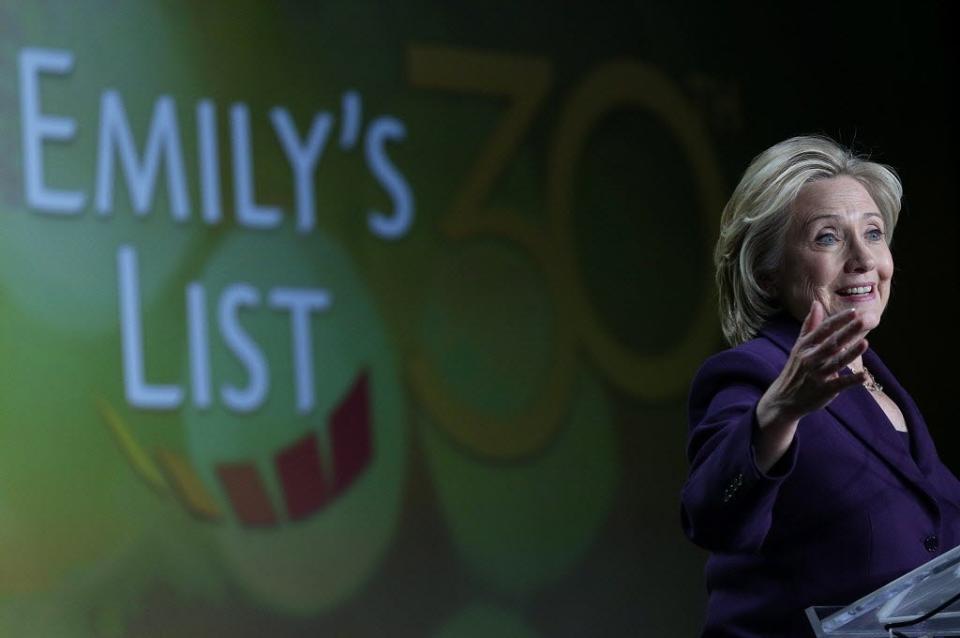
"In a lot of ways, although EMILY's list plays a hugely important role in especially competitive races, most Democratic female candidates don't benefit from the fundraising that comes from the EMILY's list organization,” Lawless said.
Jill Abahsain, the Democratic newcomer running against Fischbach in a deep-red Minnesota district, is one of those women. Abahsain said she reached out to EMILY's List early on and did not hear back. She suspects she entered the race too late to get support. Her campaign raised about $27,000 through the end of September, compared to Fischbach's $1.5 million.
"We don’t really have a machine and I’m perfectly happy running as a threadbare Democrat," Abahsain said.
Another group bringing in big money is Elect Democratic Women, which raised $7.1 million through the end of September, with $4.3 million of that coming from people who gave less than $200. Through the end of August, the PAC gave about $580,000 to 93 women candidates, the vast majority running for the House. Luria’s campaign received $10,000.
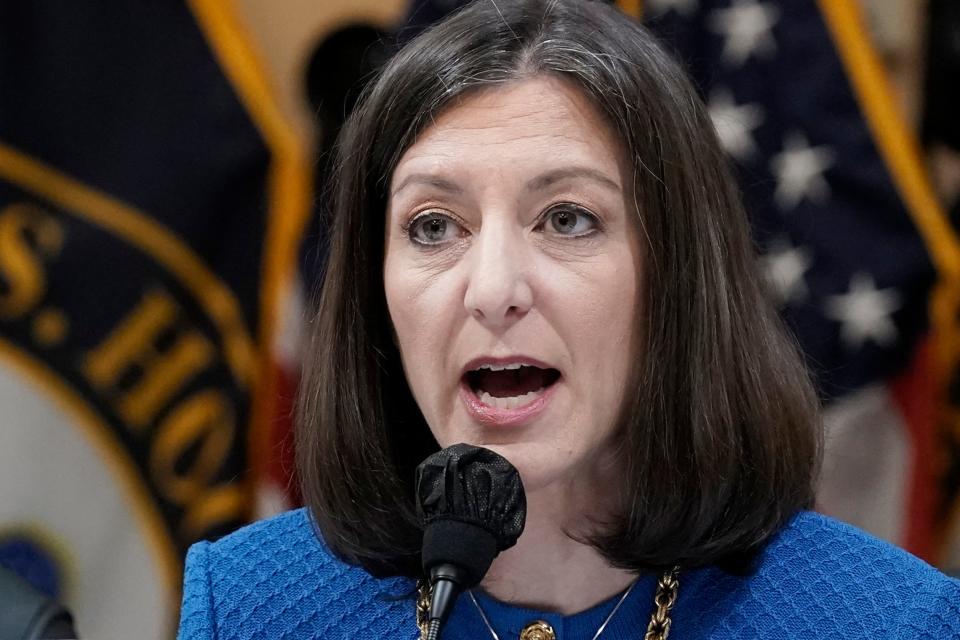
"To have a really representative Congress – representative of the people – it should represent the people," said Rep. Lois Frankel, the chair of Elect Democratic Women's board. "And women make up 50% of our population, so we’re lagging way behind in representation."
Frankel said her PAC prefers to support women who are running in competitive districts and who are capable of raising money. One of the PAC's main strategies is to help bring in donors who will give directly to campaigns, rather than run independent advertisements in support of the candidates.
While all of Elect Democratic Women's candidates support abortion rights, Frankel said the group does not dictate campaign priorities. "They run on what they think their constituents are concerned about and how they can best win their races," Frankel said. "We don’t tell them what to say or what to do."
These women-focused PACs like EMILY's List and Elect Democratic Women are separate from other groups supporting women Democratic candidates, such as PACs that back Democratic candidates more broadly or those that focus on women candidates of color.
"We are committed to electing a Democratic majority and we will campaign against anyone who wants to ban abortion, overturn elections, and support Republicans’ dangerous MAGA agenda," said Helen Kalla, the spokeswoman for the Democratic Congressional Campaign Committee.
Jan McDowell, the Democrat facing off against Van Duyne, said her fundraising strategy involves avoiding corporate PAC money. She raised $117,000 compared to Van Duyne's $3.5 million.
"Each individual in District 24 should feel like their representative is interested in them, regardless of their ability to donate to finance a campaign," McDowell said in an emailed statement.
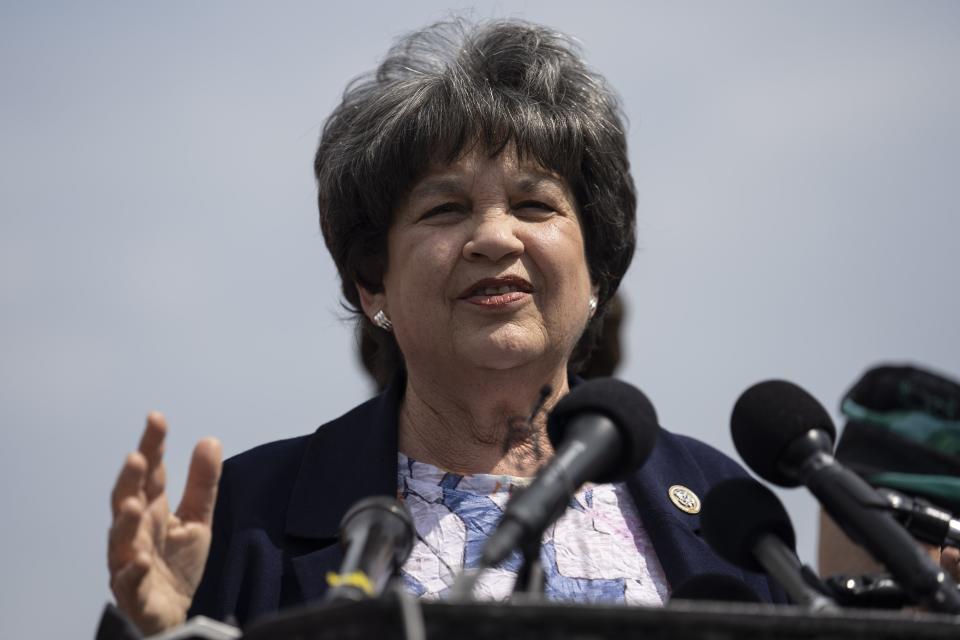
2020 Election: Republican women launch 'Conservative Squad' to take on AOC, progressives in D.C.
25% of seats in 2021: Women make gains toward more equal representation in Congress
The balance of power in the House is up for grabs in 2022. Will GOP women be the difference?
Democrats hold eight more seats in the House than Republicans do, meaning if Republicans flip just a few seats, the new balance of power would help the right upend President Joe Biden’s agenda.
Will Republican women make the difference come Nov. 8?
Swers said Republicans have become keenly aware that white male candidates do not always win, and women and people of color are important to have in the party. “They're looking to recruit more of these castes because they think that those are the candidates that win,” she said.
Still, the 91 Democratic women in the House far outnumber its 32 Republican women, according to Rutgers University's Center for American Women and Politics.
Efforts to recruit women may not have handed the House to Republicans in 2020, but they were successful: Perez-Cubas, of Winning for Women, told Fox News six out of eight seats Republicans flipped in 2020 went to women.
"When we get the Republican women to run, we need to be able to support them," Fischbach said.
Frankel said she hopes women make the difference in 2022, and she said even though she disagrees with Republican politics, she still supports getting more women in office.
"I think it’s good for Republicans to get women to run for office too," she said. "I don’t have a problem with that."
This article originally appeared on USA TODAY: GOP women raise cash to unseat Democrats with House majority at stake

